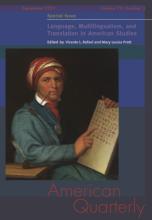American Quarterly
Volume 73, Number 3, September 2021
Korean writers living in the United States and Korea translated the poetry of the Harlem Renaissance in the 1930s, a decade in which the so-called New Negro Movement in northern American cities was declining and Japanese assimilation policies in colonial Korea were accelerating. For their work of translation, Han Hŭkku (1909–1979) used the original text of The New Negro (1925) by Alain Locke, and Han Sŏrya (1900–1976) and No Ch'unsŏng (1898–1940) drew on Japanese sources on the literature and history of the African diaspora. I argue that these Korean intellectuals explored the sense of nostalgia and the idea of class consciousness in the black literary tradition to articulate their diasporic, socialist, and utopian visions. By examining the roles of Korean and Japanese knowledge production in disseminating black culture, this essay attempts to expand the scope of American studies into a multilingual and transpacific context and thereby reconsiders a US-centric understanding of cultural circulation.
Jang Wook Huh's article, "The Harlem Renaissance in Translation: Socialism, Nostalgia, and the Multilingual Spaces of Diaspora," has been published in American Quarterly
Submitted by Ellen Palms
on
